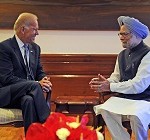It was the turn of U.S. Vice President Joseph Biden, a month after Secretary of State John Kerry’s visit to India, to reassure New Delhi that Washington remains keen on a robust partnership with India. Biden’s four day visit last week, the first for a U.S. Vice President in three decades, was aimed at laying the groundwork for the Indian Prime Minister’s visit to the U.S. in September.
Though it was clear from the beginning that Biden’s trip will not result in any “deliverables,” it remains a mystery as to what an Indian Prime Minister, at the near-end of his term and with hardly any political capital left, will be able to do to galvanise this very important relationship with a perfunctory visit to the US.
These are difficult times for the U.S.-India bilateral relationship, which has been flagging for some time, and there is little likelihood of it gaining momentum anytime soon. The growing differences between the two today are not limited to one or two areas, but are spread across most areas of bilateral concern. These include market access issues, the problems in implementing the U.S.-India civil nuclear accord, changes in U.S. immigration policies, the changing U.S. posture towards Afghanistan, defence cooperation, and trade.
Biden’s visit was specifically focused on trying to give a push to economic ties, enhancing cooperation on defence issues, pushing India for a greater role in the Asia-Pacific, and addressing climate change.
The U.S.’s explicit concern about India’s economic slowdown was reflected in Biden’s comments. He exhorted New Delhi to try to take bilateral trade with the U.S. to $500 billion by removing trade barriers and inconsistencies in the tax regime. He recommended more measures like the recent relaxation in foreign direct investment (FDI) rules by underlining, amongst other issues, policies protecting investment.
Investor confidence in the Indian economy, Asia’s third largest, is at an all-time low, with growth slowing to its lowest level in a decade. FDI slid about 21% to $36.9 billion during the last fiscal year compared with 2011-12. The U.S. is keen to see India remove investment caps in such sectors as finance, retail, and insurance. The U.S. corporate sector has been up in arms in recent months about India’s trade policies, complaining that American firms are being discriminated against and that U.S. intellectual property rights are being undermined by India.
Sporadic outbursts of reform measures from New Delhi have not been enough to restore investor confidence, even as Indian policy-makers are now busy trying to secure votes for the next elections. Policy-making in India remains paralysed and haphazard, and Washington is getting increasingly frustrated with the Indian government’s lackadaisical policies.
For his part, Biden went out of his way to assuage the concerns of the Indian corporate sector by suggesting that Washington plans to increase the number of temporary visas and green cards for highly-skilled workers from India. The concerns, however, persist because the U.S. Senate has already cleared the much talked-about immigration bill that will significantly restrict Indian IT companies in the U.S. If the House of Representatives ends up endorsing the bill, then the Obama administration will have to do some heavy lifting to mollify India.
Meanwhile, the civil nuclear deal is floundering, as U.S. companies remain wary of Indian laws on compensation claims in the event of a nuclear accident. India’s nuclear liability law is aimed at ensuring that foreign companies operating in the Indian nuclear sector assume nearly unlimited liability for accidents, a condition that all but precludes the participation of U.S. firms. After all the political and diplomatic investment by Washington in the nuclear deal, there is a sense in the U.S. that the returns have not been impressive.
The Obama administration is also focusing on climate change. Biden pushed India to work with the U.S. to reduce the flow of hydro-flurocarbons and provide opportunities to the scientific establishment to work on green technology options. The U.S. is already working with China on a joint effort to curb greenhouse gases.
Biden also tried to ease Indian concerns on Afghanistan by underlining that the Taliban would have to give up ties to Al-Qaeda and accept the Afghan Constitution as part of the reconciliation process. New Delhi remains concerned about the impact on Indian security of the U.S.’s withdrawal from Afghanistan.
Although Biden said there are no places where Indian interests and American interests diverge “worldwide, regionally or domestically,” in the absence of a big idea to push the relationship forward strategically, the tactical issues, where there are significant differences between Washington and New Delhi, continue to shape the trajectory of bilateral ties.
The relationship is now at an inflection point. The two sides need to start thinking seriously about bringing it back on track. New Delhi, in particular, needs to acknowledge the importance of what Biden suggested when he said that “there is no contradiction between strategic autonomy and strategic partnership.” In the name of “strategic autonomy” New Delhi has become adept at scuttling its own rise.
At this moment of significant geo-strategic flux in the Indo-Pacific, India and the U.S. need each other like no other time in the past. Biden’s visit has underlined India’s importance in the U.S.’s strategic calculus. It is now for India to decide what role it sees for the U.S. in its foreign policy matrix and as a corollary what role it sees for itself in a rapidly changing global order.
Dr. Harsh V. Pant is a Reader in International Relations in the Defence Studies Department at King’s College, London, focusing on Asian security issues.
This article was exclusively written for Gateway House: Indian Council on Global Relations. You can read more exclusive content here.
For interview requests with the author, or for permission to republish, please contact outreach@gatewayhouse.in.
© Copyright 2013 Gateway House: Indian Council on Global Relations. All rights reserved. Any unauthorized copying or reproduction is strictly prohibited.


